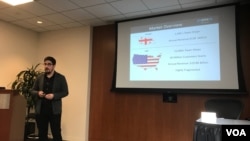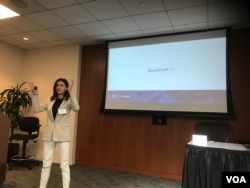Boris Kiknadze, chief executive of Pawwwn, took a deep breath as he looked out to the crowd of Silicon Valley venture capitalists and began his pitch.
With just 10 minutes to speak, Kiknadze rapidly described his business idea — Pawwwn, an online payment and management system to make transactions easier for pawnshop owners and their customers. The pain point for pawn shops is payment. Pawwwn takes away that pain, he said.
For months, Kiknadze and his co-founder had developed Pawwwn in his home country of Georgia before getting on a plane for San Francisco. Since the firm launched in March, Kiknadze has had 20 customers trying out the service.
But with 1,400 pawnshops in Georgia and 12,000 more in the U.S., Kiknadze saw a big opportunity. And to achieve that, he needs cash — $1 million, which he said he would use to launch Pawwwn in the U.S.
Competing for investors
Kiknadze is part of Startup Georgia, a project administered by Georgia's Innovation and Technology Agency, that connects U.S. experts and investors with startups in Georgia.
More than 250 entrepreneurs tried out in Georgia to qualify for a week of training in Tbilisi, the nation's capital. Among those 50 who participated in the training, 20 were selected for seed funding and three months of additional training with a Silicon Valley expert with weekly videoconferencing meetings.
Of those, eight were chosen to travel to the U.S. for a boot camp and to pitch to investors directly.
Georgia, a country of fewer than 4 million people, is looking to the success of small countries, such as Estonia and Israel, to pitch itself as a burgeoning tech hub, said Mark Iwanowski, founder and president of Global Visions-Silicon Valley, which provided the U.S. support for the program.
For U.S. investors, typically reluctant to invest beyond U.S. tech hubs, there is an opportunity to get more value in overseas companies, where labor costs are lower, he said. To attract these investors, foreign companies need to incorporate in the U.S. and set up a team here.
Over the past week in Silicon Valley, the Georgian entrepreneurs received one-on-one mentorship training as they refined their pitches. They heard from lawyers on protecting intellectual property and listened to venture capitalists talk about how to approach investors.
“If a venture capitalist says they love it, it kind of doesn't mean anything,” said Steve Goldberg, operating partner at Venrock, a venture firm. “My advice is to have people on the team who understand venture-speak.”
“Understand what the investor is looking for,” said Ron Weissman of Band of Angels, Silicon Valley's oldest seed fund. He suggested approaching investors seeking a conversation — “I’m not here to raise money. I'm here to get a sense of what it would take to interest you.”
Tech's next 'unicorn'?
That is the kind of approach honed by Vamekh Kherkheulidze, founder and medical adviser to ORsim, a Georgian operating room virtual reality simulator.
By slipping on a virtual reality headset and a special glove that gives all the sensations of holding instruments and operating on a person, medical students can better learn how to become surgeons, Kherkheulidze said. And that's important, because there's a shortage of surgeons both in the U.S. and worldwide.
From potential investors, ORsim is looking “for supporters,” he said. “We promote new ways of education and we want investors who understand that.”
Still, his ambition is big. "We want to expand and expand fast," Kherkheulidze said. Already, ORsim, with $35,000 in pre-seed funding from Startup Georgia, has an appendectomy simulator.
“Our hope is to be a unicorn,” Kherkheulidze said, referring to the term used to describe startups worth more than $1 billion in valuation. But in addition to greatly improving surgical training worldwide, he sees his company as a way to help his home country.
“If we are worth $1 billion, you can increase the economy. What was Skype's influence in Estonia?” he said, referring to the Estonian internet communication service bought by Microsoft for more than $8 billion.
After the pitches, the entrepreneurs mingled with investors. No one got investment on the spot, but most are hopeful and are following up with meetings next week.
This report was produced in collaboration with VOA's Georgian Service.












